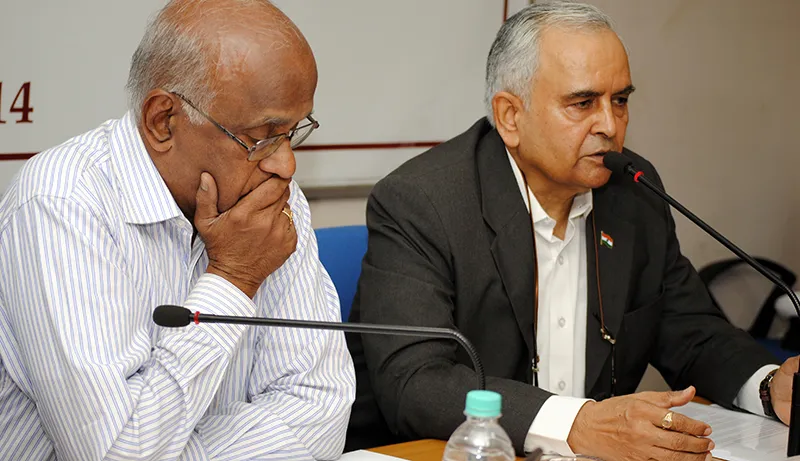Arunachal Pradesh Governor Lt Gen. (Retd) Nirbhay Sharma says there is an urgent need for utilising the skills of trained ex-servicemen who leave the services in their prime age.

Arunachal Pradesh Governor Lt Gen. (Retd) Nirbhay Sharma has emphasized on the need for utilising the skills of trained ex-servicemen who leave the services in their prime age.
Chairing a conference on "Utilizing Military Veterans to add value to developmental initiatives in Rural and Semi-Urban Areas" on May 6, 2014 at Observer Research Foundation, the Governor pointed out that though the Government has extensive institutional mechanisms in place to assist these ex-servicemen in pursuing second careers, the majority is unable to take advantage of these initiatives for a variety of reasons.
The Governor, whose was a Distinguished Fellow at ORF, said there is a need for utilizing this trained, disciplined and motivated resource for nation building. The discussants at the conference were Brig (Retd) RK Sharma, Col RP Singh (Retd), and Prof. (Maj Gen, Retd) GG Dwivedi.
Opening the session, Brig RK Sharma, giving an informative and statistical presentation on the role of Army Welfare Placement Organization (AWPO) and the Directorate General of Resettlement, brought out that the organization assists the veterans and dependents of army personnel seeking job opportunities in the corporate sector and assists business houses in identifying ex-army personnel for employing as per trade requirement on pan India basis.
Brig Sharma pointed out that there are about 30 lakh ex-servicemen in India, and every year about 50,000 more join this community. Almost 60% of the retirees register with the organization -- of which 30% are engineers, or have a technical background. He also brought out the availability of skills and trades within the Army and their equivalency in the civilian context. He concluded on the note that mature and stable, adaptability to work culture, goal-oriented leadership, dedication, and responsibility are the qualities of the veterans who could contribute to value developments in rural and semi urban areas.
Taking the discussion further, Maj Gen GG Dwivedi suggested ways in which the veterans could contribute to nation-building. Commenting on the civil-military relations, he suggested that the sector is narrowly structured at present; and there was a need to widen the scope and opportunities as to how to engage military with the civil society. Echoing Governor Nirbhay Sharma’s remarks, he added that the ex-servicemen, after their long service, tend to go back to their villages with a mind-set oflooking for a job that would provide themlong years of secured employment. This attitude needs to change and ex-servicemen should develop themselves to be creative job entrepreneurs.
Maj Gen Dwivedi said the government also needs to create a conduciveenvironment and projects to utilize the service of ex-servicemen for the development of villages and rural areas. He said that while on one hand India needs to generate 12 to 15 million jobs annually but in practice creates only2 to 3 million. There is also the problem that projects and initiatives undertaken by the Government and some research Institutions do not reach the villages due to poor management and lack of proper implementation. This is primarily because of lack of ’last mile’ capacity and expertise. This is where the ex-servicemen can be utilized for better implementation of rural projects as they can act as facilitators and also with some training be employed for social auditof these projects. He also pointed out that there are numerous projects where with additional training their skills could be utilized such as those dealing with development of solar water pumps and solar based electrical grids.
Col R.P.Singh emphasized on the vital issues raised by the Governor. He stressed that there are numerous veterans in rural areas who are not looking for employment but are keen to volunteer their skills and expertise for development of their region. He also pointed out that in areas such as the financial sector there are numerous examples where government projects through banking institutions do not reach Self Help Groups. The ex-servicemen can play a role in providing last-mileconnectivity. He felt that the ex-servicemen can facilitate other projects such as universal immunization programme, skill development at the village level and assist Panchayats and Gram Sabhas in their functioning. They could also be utilized for community based disaster management initiatives. He felt that the military should not only be viewed as providers of national security but also as providers of national capacity generators.
Col R.P.Singh re-iterated that the Ministry of Defence, during the last phase of tenure of the serving personnel, should impart training in entrepreneurial skillsbefore sending them out to the civil society as this would also lead tostrengthening the civil-military relationship. He also called upon ORF to take up a project to train the serving personnel on the ’last mile connectivity’ concept. He concluded his presentation highlighting the need for attitudinal changes within the environment so that ex- servicemen can contribute to society. He also called upon the Planning Commission and Rural Development Ministry to utilize the ex-servicemen and their expertise.
During the subsequent discussions, there were suggestions that the services need to be able to provide data of available manpower on a suitable platform as this would enable corporates to recruit easily. The aspect of being able to establish linkages between ex-servicemen organizations and corporate entities was also pointed out as it was felt that such linkages would assist corporates in properly utilizing their resources in rural areas while undertaking CSR projects under the new act.
(This report is prepared by Garima Sahdev, Research Assistant and Sruthi R, Research Intern, Observer Research Foundation, Delhi)
The views expressed above belong to the author(s). ORF research and analyses now available on Telegram! Click here to access our curated content — blogs, longforms and interviews.




 PREV
PREV

